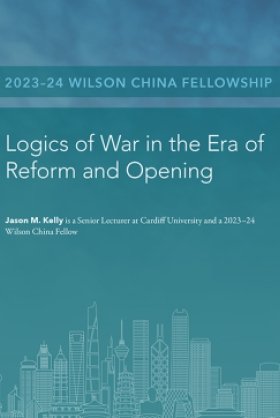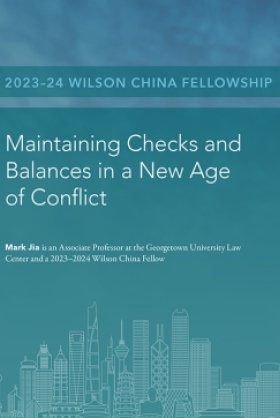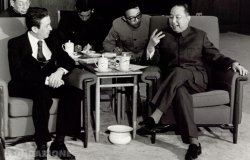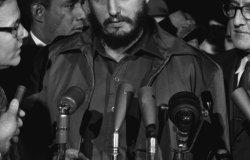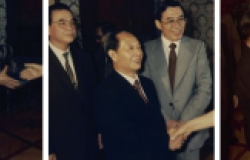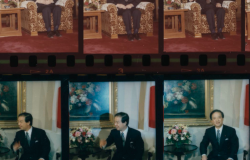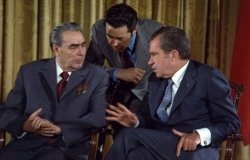China-US Relations: Did Secretary Blinken’s Trip Move the Needle?
In this edition of Wilson Center NOW, we speak with Robert Daly, Director of the Wilson Center’s Kissinger Institute. He highlights Secretary Blinken’s recent trip to China and examines whether a new Cold War has developed between the two nations. Daly also discusses how the Biden administration’s goal of “managed competition” with Beijing is playing out with continued tensions over the South China Sea, Ukraine conflict, and China’s attempts to leverage the ongoing Israel-Hamas War for improved relations with the global south.
EPISODE TRANSCRIPT
China-US Relations: Did Secretary Blinken’s Trip Move the Needle?
This is an unedited transcript
Hello, I'm John Milewski. Welcome back to another episode of Wilson Center, now a production of the Woodrow Wilson International Center for Scholars. My guest today is Robert Daly. Robert is director of the Wilson Center's Kissinger Institute on China and the United States. And of course, we'll be talking about China.
Robert, always a pleasure to have you with us. Thanks for joining us. Good to be back. So let's begin with the most recent news, which is Secretary Blinken's trip to China, met with President Xi, went to a record store. He's a bit of a musician and a music fan. And the coverage in China, you know, humanized him is is how it was put by many media outlets.
A very positive encounter. Tell us about the trip and if there was any impact from it beyond symbolism. Well, I hope that the buying of a Taylor Swift album gave him a boost in China. He had been the the American official that China had decided it was going to pick on for a little while. And this went back early in the Biden administration to when Secretary of State Blinken met with national security Adviser Jake Sullivan, with Wang Yi and Yang Jiechi here in Alaska.
You may remember early in the administration there was a very contentious meeting there. And this was followed in China's from China's point of view, by the balloon incident in which Blinken, they held personally responsible for not going on a trip to China. So China had been quite deliberately treating other American officials, among them Secretary of the Treasury Janet Yellen, better than Blinken as a way of punishing him for his misdeeds.
But here he seemed to get quite humanized by eating dumplings and buying a Taylor Swift album, although that wouldn't have been my choice for him. He said when he was in the record store that he was a seventies fan. So I would have thought, I don't know, Crosby, Stills and Nash or something else. I thought you might have some Chinese recommendation.
Well, that would have been really good if he had purchased a twee Jen, who's the Bob Dylan Godfather of Chinese Rock and Roll album. I think he would have done himself even a greater favor. So but China seems to have given him a little more space than usual, despite the fact that the agenda, I think, for both sides was the repeating of talking points that the other side knew and did not care to hear.
In particular, as Secretary of State, Blinken was warning China that if it continued to supply engines for drones and missiles to Russia, that its banks which aided in these transactions could very well be sanctioned. So that was one of his biggest warnings. And his other following up on Secretary Yellen's trip was that China's overcapacity is a threat to American and European economies.
He had a the list goes on, of course, and that includes China's increasing aggression around the second Thomas Shoal, which is in the Philippines exclusive economic zone. This has become another potential flashpoint. And China, for its part, also has a list of complaints, many of which involve the South China Sea and Taiwan. So this was a working trip, didn't seem to be a lot of progress, but it's part of both sides.
Attempts to increase the diplomatic side of the relationship so that we're not just at daggers drawn and are not merely making long distance mutual accusations. You mentioned a number of things I want to follow up on, but I start with an observation that at least Taylor Swift wins again, right? If no one else wins another album sale, just what she needs.
So over the years, Robert, you and I have talked about this notion of a Cold War. And, you know, you reluctantly came around to thinking that the terminology may be somewhat appropriate. Yes. We have a new book by our former Wilson scholar and colleague, David Sanger of the New Cold War, as one of which is China to Cold War, is in his take one with Russia, one with China.
How do you look at it now? Do you view this as a not that Cold War is some kind of mathematical equation, Right? It's more a work of art than it is a work of mathematics. But how do you think about it now? Is there a full blown Cold War underway between China and the United States? I'm not sure it's quite full blown yet because I don't think it's sufficiently deeply socialized.
Neither the United States and China has gone on a complete Cold War footing in terms of their industrial capacity, their arms manufacturers. Still, I think that Cold War is the most fruitful, most complete framework. We're looking at this relationship. Those who don't who are saying some version of, well, it's more extreme competition, but the job is merely to manage it as the job has always been.
If you look at it with that framework, I think you are constantly whipsawed by both sides. The United States in particular, reaching out, sending missions to China, even as we continue to escalate or prosecute a more confrontational relationship. So say we you know, Blinken is in China, but we also just had a very important summit meeting between President Biden and Prime Minister Fumio Kishida of Japan.
And then President Marcos came in and we had a three way summit. This like the quad, like a caucus, like last summer's Camp David summit between Japan, South Korea and China are aimed at containing and constraining China. China makes this accusation. It's clearly true. We sometimes deny it, but this is what we have in common with many of our partners in East Asia Pacific.
China, for its part, again continues to double down on its support for Russia. Most alarmingly, with this report of its missile engines, it clearly sees the war between Israel and Hamas as working to its advantage to gain credibility in the global South as a provider of global order in opposition to the United States. So both sides determined to avoid war, but also determined to prevail globally across every index of power.
By all means, short of war. So a Cold War. And it's not just, you know, that we have. David Sanger's new book that we launched here at the Wilson Center. Even scholars like David Michael Lampton spent much of his career at Johns Hopkins sites, seen by many as somewhat more moderate. I think one of our most important China scholars.
His new book is subtitled From Cold War to Cold War. So this idea has is, I think, now broadly but not universally accepted among the scholar class, but not fully socialized. So I wouldn't say full blown Cold War yet. But yes, I think that's what this is. And I think that it is going to become clearer to ever larger segments of our societies.
I read a lot of the coverage of the Blinken trip, the aftermath, the summary type coverage. And what came up repeatedly is that there's an overall stability to the relationship between the U.S. and China, even if there is sort of a simmering Cold war. And I'm wondering if you can help us sort out how much of the tensions between the countries are real significant built around issues like Taiwan, like the South China Sea, and how much of it is that in U.S. politics?
It plays well to be aggressive toward China. So I think that while clearly there is a domestic political aspect in both countries, I think this has been overplayed. You hear, you know, from China in particular, but for Americans as well, that a lot of this is just domestic bluster or it's merely misperceptions. We have incommensurate interests in areas where, while I I'm confident that war can be avoided, the chances of conflict have gone up slightly with our version of what an acceptable security architecture in the Western Pacific is, is simply at odds with China's very, very difficult to reconcile.And we see more tension from the Senkaku Islands through the Taiwan Strait into the South China Sea, down into the Philippines and even out into Oceania. This is a genuine security dilemma. Our economic models also are increasingly at odds with each other. China is now producing some goods like electronic vehicles, among them not only more than China consume, but more than the world can consume.
And so there is a genuine concern that China is going to try to export its way out of its current economic doldrums under selling subsidized products and thereby decimating other countries industries. This is a real issue. The very different values relatively liberal, relatively illiberal, that inform the ways we're trying to shape global order. Those values, too, are not easy to compromise.
So yes, there's a domestic political factor and there's regrettable rhetoric on both sides. There are misstatements. There lives, lack of proportionality in some cases. I just don't think you can wish away whether it is the economic, the technological, the security, the ideational pieces, those are there. On the security front, there is data security looms large. And whether it be tick tock or Tesla, tensions rising in that realm.
Talk to us about that. Well, there are different aspects to security concerns. TikTok is has been effectively banned. We have said that China has up to a year with a little grace period to sell TikTok. I should say Bytedance has up to a year to sell it to a non-Chinese owner. China has said that it will not do that.
It will not give in to blackmail and what they see as a blatant attempt to strip China of one of its most successful assets. That means it's a ban. But for security, there are two concerns about Tik Tok. The first has to do with security and China capturing American data. It's not quite clear how that constitutes a security threat in the long term, given the kinds of data one gets from TikTok.
But we also know that bundlers are gathering and selling data to various and sundry, including China anyway. So it's not clear that TikTok greatly increases that danger. The second danger with TikTok is the propaganda piece that either through pushing forward material that is pro-China or keeping off material that is critical of China. China can use TikTok over time to shape American views as as it would like to do.
The the Tesla piece electronic vehicles. There's a different concern, which is that these cars which are you know software on wheels for China ID think of it as Huawei with an accelerator right there, you could really gather much more critical data about who is going where, when, and you could even potentially interfere with those systems in the cars.
China's also worried about this, which is why on the trip, Elon Musk's trip this week, he had to agree to work with Baidu, which is a Chinese Internet company, to have them run the key digital part of Tesla's electronic vehicles in China. Could we do something like that here? Maybe. Although I suspect that anti-China sentiment is so strong that we won't let China's EVs in under any circumstances.
Another potential flash point continues to be the South China Sea. It almost plays out like white noise simmering in the background for decades. Admiral John Long Aquilino, one of those great military names, the commander of U.S. forces in the Indo-Pacific, stepping down this week in a change of command. He said recently he accused China of using the boiling frog strategy rate, gradually increasing the temperature on till it reaches a boiling point when it's too late.
The frog doesn't know it. He would say in this case, the rest of the world doesn't realize the risk. And he said, China's getting more aggressive, they're getting more bold, it's getting more dangerous. Talk to us a bit about the South China Sea and the prospects for a Cold War turning hot in that regard. Well, first, this is this is a slander against frogs.
It actually isn't true that frogs stay in the pot while they boil to death. Frog and lemming lemmings don't bother each other. Let me just let me just jump off while we're. And frogs really don't see an interest in letting themselves boil. So, yes, China is gradualist. China is patient. But I think that the alarm bells really rang and this boiling frog approach back in 2016, this is it was really that it was when China built manmade islands, militarized them when and then the permanent Court of Arbitration in The Hague said that China had no claims in the area under the UN Convention on the Law of the Sea.
China ignored that finding and the rest of the world proceeded to do nothing. I think that that series of events in 2016, more than any other, was what changed Washington's mind and help more people to realize that a relationship that had been based on engagement was now fundamentally contentious. So I think we're very weak to this one. This is why the Philippines post 230 has led America into a growing number of bases using Philippines bases.
Rotational there, warming up even to Japan. So I. I know what Aquilino was warning about, but I think that we are awake to this and we've been very clear that any Chinese action on the second time Thomas Shoal would invoke our defense treaty with the Philippines. So I think we're a little more alert than that independent of US-China relations.
What is Ukraine doing to China's and China's position on Ukraine? What does that doing to China's global standing? It's doing several things simultaneously. One, we should note that China continues to double down on support for Russia. Various forms of material support, rhetorical support. Vladimir Putin will soon be visiting Beijing. So even though I still think that China probably didn't want and didn't anticipate this war, they are still not willing to let Russia fail because they see it as the essential partner in their competition with the United States.
They continue to double down. And the big cost that they've paid for that has been in Europe, where they're already increasing skepticism about China before the invasion of Ukraine. But a residual sense that maybe Europe did need investment treaty, you know, free trade agreements. There's a lot of concern about holding on to their commercial relationship with China, especially in Germany.
That's really been hurt. China. China's suffered a big blow that way. At the same time, China has used Ukraine and the war between Israel and Hamas in its global diplomacy to say both of these wars were caused by a hegemonic United States in different ways. China stands as the neutral lover of peace and as the builder of infrastructure that stands only for development all over the world.
This has been China's new offer to the global South, and that seems to have won some adherents as measured by people voting with countries, voting with China in the United Nations. So they've been hurt by it vis a vis Europe. They may have gained by it in their global competition, Cold War with the United States, especially among less developed nations.
So you already mentioned the Hamas Israel conflict in a similar scenario. Anything else to add to that as far as what China's position may be doing to its global standing? Well, again, it's historically China has said that it has always been a supporter of the Palestinian cause. That's largely true. That has been tempered somewhat. Beginning in the late eighties, when China began to develop what became a very robust relationship with Israel.
Much of it in the early days, was about arms sales from Israel to China. But the relationship also comprised high tech and potentially very important projects like desalinization projects. Israel's a leader on this. China has a strong interest in bringing it to scale as its coastal cities and coastal rice paddies begin to get inundated. But they have clearly leaned entirely to the side of Hamas and Palestine here and are using that again to say that they stand with the global South and that they are, in fact, and this is an explicit part of Xi Jinping's diplomacy.
Now, the leader of the global South, China, despite being the world's biggest second biggest economy, first in purchasing power parity, despite on the one hand claiming that its economic success gives it a right to global leadership vis a vis the global South. We are but a peace loving, poor, developing country, and we're willing to lead the rest of you in opposition to the United States.
And while it's legitimate for us to see that as somewhat self-contradictory, it's working for China. It's working for China and much of the rest of the world. Many have raised the specter of or connected dots between support for Ukraine and, if not support for Ukraine. What that message might be to China as it relates to Taiwan. Do you connect the dots in any way in that regard?And do you have any insight into how China is viewing the situation? And does it see any relation to what their future designs may be on Taiwan? Well, this has been a guessing game, a major claim ever, ever since the invasion. And it is, I think, logical to make those connections. China is studying the war in Ukraine very closely.
They, of course, game many, many scenarios in Taiwan constantly and did long before the war in Ukraine. I don't think that we know of a certainty what lessons they're drawing. We've spoken about this before. I tend to think that overall Ukraine would be more of a cautionary tale for Taiwan. But the other possible interpretation is that the lesson of Ukraine is if you're going to go no half measures, go fast, go with everything, settle up later.Don't be don't be incrementalist. Again, possible. I don't think we really know. But given China's very weak economic domestic position, I tend to think that Ukraine, on balance, would make China slightly more cautious. But no one really knows. Final thought, Robert. For this time around, as you look at the calendar and anticipate things that may be happening around the globe that are scheduled, what are the prospects in the near term for either in additional conflict or additional cooperation between the U.S. and China?
Or are we in some sort of a holding pattern until things are resolved in Ukraine and in Gaza? Well, in the United States presidential election and the presidential that's that I think is the biggest waiting game here. Both Ukraine, the Middle East could to some degree be protracted or frozen conflicts that seem unlikely that they'll be wrapped up by the presidential election.
And China, I think, is going to wait and see who prevails in November. They are studying, you know, both second administrations quite closely, and they'll be ready for either outcome, but they will play it very differently. And this is something I think we could revisit come December or late November. Yeah, sure thing. And I look forward to that.
Robert Daley is the man. If you come to the Wilson Center and see the programs tab at the top of the homepage, you can find the Kissinger Institute and all the work that Robert and his colleagues are up to. Thank you for joining us today, Robert. Thank you. Hope you enjoyed this edition of Wilson Center now and that you'll join us again soon.
Until then, for all of us at the center, I'm John Milewski Thanks for your time and interest.
Hosted By

Kissinger Institute on China and the United States
The Kissinger Institute works to ensure that China policy serves American long-term interests and is founded in understanding of historical and cultural factors in bilateral relations and in accurate assessment of the aspirations of China’s government and people. Read more




